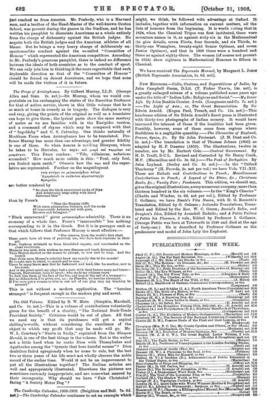The Frogs of Aristophanes. By Gilbert Murray, LL.D. (George Allen
and Sons. 2s. net.)—Dr. Murray, whom we would con- gratulate on his exchanging the status of the Emeritus Professor for that of active service, shows in this little volume that he is as much at home in comedy as in tragedy. The dialogue is easy and racy, giving the points of the original as well as a translator can hope to give them ; the lyrical parts show the same mastery of metre as we are familiar with in the Euripides version, and a command of rhyme which may be compared with that of " Ingoldsby " and C. S. Calverley. One thinks naturally of Hookham Frere when Aristophanes has to be translated. Pro- fessor Murray has more than one advantage, and greater fidelity is one of them. So when Aeacus is reviling Dionysus, whom he takes to be Hercules, he says : sal F.eapZ gal 1mA/4c:et Ka) iiiapdyraTe. This Frere renders : "Vile, villainous, nefarious scoundrel." How much more subtle is this : "Foul, only foul, yea foulest upon earth." Observe how the wag and the super- lative are represented. Further on the magniloquent
Tote oviryos re peXavoKcipatos whpa
2AXErSYTUSS vs 0"Ko7/EAOS oliesiToo-rayhs
Opoopoilirt
are better rendered by " so close the black encaverned rocks of Styx And Acheronian crags adrip with blood Surround thee"
than by Frere's
"Thee the Stygian cliffs With stern adamantine durance, and the rocks Of inaccessible Acheron red with gore, Environ and beleaguer."
"Black encaverned" gives I.LeaavoedpaLos admirably. There is an economy of a whole line. Frare's " inaccessible " has nothing corresponding to it in the Greek. But it is in passages such as that which follows that Professor Murray is most effective :— " For observe, from the world's first start Those poets have all been of practical use, who have been supreme in their art.
First, Orpheus withheld us from bloodshed impure, and vouchsafed us the great revelation.
linsaens was next, with wisdom to cure diseases and teach divination.
Then Hesiod showed us the season to plough, to sow and to reap. And the laurels That shine upon Homer's celestial brow are equally due to his morals ! He taught men to stand, to march and to arm There be many brave men that he fashioned and bred, like La raachus, now in his tomb, And in his great spirit my plays had a part, with their heroes many and brave- Teucere. Patrocluses, hone at heart; who made my citizens crave To dash like them at the face of the foe, and leap at the call of a trumpet !— But no Sthenoboia I've given you, no ; no Phaedra, no heroine strumpet.
If I've once put a woman in love in one act of one play may my teaching be scouted."
This is not without a modern application. The "heroine strumpet" is frequent enough in the modern play and novel.














































 Previous page
Previous page